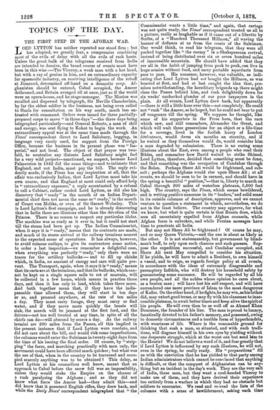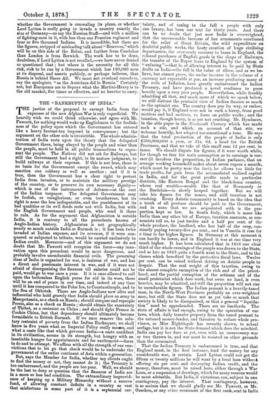TOPICS OF THE DAY.
THE FIRST STEP IN THE AFGHAN WAR. LORD LYTTON has neither repented nor stood firm ; but has adopted, we greatly fear, a compromise combining most of the evils of delay with all the evils of rash haste. Unless the great bulk of the telegrams received from India are intended to deceive, the broad course of events must have been in this wise :—The Viceroy, a weak man with a hot head, but with a ray of genius in him, and an extraordinary capacity for spasmodic industry, on receiving intelligence of the rebuff at Jumrood, determined off-hand on a dramatic coup. Af- ghanistan should be entered, Cabul occupied, the Ameer dethroned, and Britain avenged all at once, just as if the world were an opera-house, and he stage-manager. The Mission was recalled and dispersed by telegraph, Sir Neville Chamberlain, by far the ablest soldier in the business, not being even called to Simla for consultation on his way south, much less en- trusted with command. Orders were issued for three partially- prepared corps to move " in three days "—the three days being telegraphed particularly—and General Roberts, a man of skill and energy, was sent flying to Kohat to begin the work. An extraordinary appeal was at the same time made through the Times' correspondent direct to Lord Salisbury, begging, in language very rarely used, for support from the Foreign Office, because the business in its present phase was " Im- perial," and not local. The object of that prayer was two- fold, to neutralise any distaste Lord Salisbury might feel for a very wild project—sanctioned, we suspect, because Lord Palmerston in 1842 did the same thing—and to intimate that England, and not India, must pay the bill. The reply evi- dently made, if the Times has any inspiration at all, that the affair was exclusively Indian, that Lord Lytton must take his own course, and that England at most could only afford help in " extraordinary expenses," a reply accentuated by a refusal to call a Cabinet, rather cooled Lord Lytton, as did also his discovery that " ready" in the mouth of an Indian Depart- mental chief does not mean the same as" ready," in the mouth of Count von Moltke, or even of Sir Garnet Wolseley. This is Lord Lytton's first campaign, and he is already discovering that in India there are illusions other than the devotion of the Princes. There is no reason to suspect any particular Riches. The machine was as ready as it ever is, but it could not start till the steam had been got up. The Indian Commissariat, when it says it is " ready," means that its contracts are made, and much of its stores arrived at the railway terminus nearest to the expected scene of operations. It has always, however, to avoid ruinous outlays, to give its contractors some notice, to order a last inspection—we remember a delightful case, when everything was perfectly "ready," only there were no traces for the artillery bullocks — and to fill up chinks which, in India, no amount of energy and care will quite pre- vent. The Transport, again, when it says it is " ready," means that its carts are at the terminus, and that its bullocks, which can- not be kept on a single square mile to rot of murrain, will be collected in a few hours, which means in practice three days, and then it has only to load, which takes three more. And both together mean that, if they have the indis- pensable time allowed them, they will start in ten days or so, and proceed anywhere, at the rate of ten miles a day. They must carry forage, they must carry or find water, and if they move more quickly the beasts will sink, the march will be jammed at the first ford, and the drivers—not too well treated at any time, in spite of all the chiefs can do—will abscond by scores a day. As the railway termini are 200 miles from the Passes, all this implied in the present instance that if Lord Lytton were resolute, and did not care about the bill, and would risk some imperfections, the columns would enter the Suleiman in twenty-eight days from the time of his issuing the final order. Of course, by " strip- ping" the force, and marching practically with men only, the movement could have been effected much quicker; but what was the use of that, when in the country to be traversed and occu- pied scarcely anything was to be obtained I This delay, as Lord Lytton or his counsellors well knew, meant that an approach to Cabul before the snow fell was an impossibility, unless they would stake the Empire on the chance of a rush paralysing the Afghans ; and as they did not know what force the Ameer had—they admit this—and did know that it possessed English rifles, they drew back, and while the Daily News' correspondent telegraphed that " the Commis' tsarist wants a little time," and again, thatcartage was not quite ready, the Times' correspondent treated us all to a picture, really as laughable as if it came out of a libretto by Scribe, of a " Hundred Thousand Hillmen," all waving the banner of defiance at us from the crests of the Suleiman. One would think, to read his telegram, that they were all packed together like " the enemy " in a Shakspearean revival, instead of being distributed over six or seven hundred miles of inaccessible mountain. He should have added that they are all in the habit of jumping from peak to peak, can live in huge armies without food, and carry portable aqueducts from pass to pass. His nonsense, however, was valuable, as indi- cating that Lord Lytton had not bought the Hillmen, as was boasted at first, and had at last caught the idea that, pro- mises notwithstanding, the hereditary brigands up there might close the Passes behind him, and rush delightedly down for six weeks' unchecked plunder of our poor taxpayers in the plain. At all events, Lord Lytton drew back, but apparently —there is still a little haze over this—not completely. He could not " rush" the Ameer, as he hoped, but he could not bear to put off vengeance till the spring. We suppose he thought, like some of his supporters in the Press here, that the race which saw, and still remembers, Alexander the Great, and which will wait three generations for an object or a life-time for a revenge, lived in the foolish hurry of London litte'rateurs, would deem six months an eternity, and if he waited as they themselves would do, would consider him a man degraded by submission. There is no curing some illusions about the East, even among a people who read their Bibles, and remember how David waited to strike Shimei. Lord Lytton, therefore, decided that something must be done, and that something was the occupation of Candahar through the Bolan. Perhaps Shere All would be frightened, and sub- mit ; perhaps the Afghans would rise upon Shere Ali ; at all events, we should be seen to be in earnest, and should have in the spring a beautiful " position,"—that is, liberty to march on Cabul through 200 miles of waterless plateaux, 5,600 feet high. The country, says the Times, which seems bewildered, and is writing positive nonsense in its " leaders," and solid sense in its outside columns of description, approves, and we cannot venture to question a statement in which, nevertheless, we do. not in the least believe. The country may approve, for what we know, but what is quite certain is that Russia does, which sees all uncertainty expelled from Afghan counsels, while Afghan force is unbroken, and while Persian messages have time to penetrate all India.
But may not Shere All be frightened ? Of course he may, and so may Queen Victoria,—and the one is about as likely as the other. It is not statesmanship, but government by blind- man's buff, to rely upon such chances and such guesses. Sup- pose the expedition successful, and Candahar occupied, and Shere All next May compelled to consider his situation. If he yields, he will have to admit a Resident, to own himself a vassal, and to reign, as regards foreign policy at all events, in accordance with the ideas of extremely disagreeable and peremptory Infidels, who will destroy his household safety by guaranteeing some successor. He will be regarded by all his own people, and all the nobles whose opinion he cares about, as a beaten man ; will have lost his self-respect, and will have surrendered one more province of Islam to the most dangerous of Karns. On the other hand, if he fights, he may win, as his father did, may extort good terms, or may fly with his clansmen to inac- cessible plateaus, to await better times and keep alive the spirit of his people. He will even then be as well off as Ahmed Khan Douranee, the founder of his line. The man is proud to lunacy, fanatically devoted to his father's memory, and possessed, owing to domestic circumstances and a terrible form of hypochondria, with weariness of life. Where is the reasonable ground for thinking that such a man, so situated, and with such tradi- tions, will disgrace himself in his own eyes by yielding without one desperate struggle, which at the worst can but send him to the Houris? We do not believe a word of it, and fear greatly that if Lord Lytton is influenced by any such illusions, he will not, even in the spring, be really ready. His " preparations " fill us with the conviction that he has yielded to that party among Indian administrators which cannot be convinced that anything is difficult, or that the conquest of Afghanistan can be any- thing but an incident in the day's work. They are the very salt of India, these men, but they want a cool-headed Viceroy to make use of them, and they have derived their experience too entirely from a warfare in which they had no obstacle but soldiers to encounter. We read and re-read the lista of the columns with a sense of bewilderment, asking each time whether the Government is concealing its plans, or whether Lord Lytton is really going to invade a country exactly the size of Germany—so say the Russian Staff—and with a million of fighting-men in it, with less than one Prussian regiment and four or five thousand Indians. It is incredible, but there are the figures, stripped of misleading talk about "Reserves," which will be on this side of the Bolan, and further from Candahar than London is from Berwick. The work has to be done, doubtless, if Lord Lytton is not recalled,—we have never denied or questioned that ; but where is the necessity for all this risk, risk to be run by a Government which has 180,000 men at its disposal, and asserts publicly, or perhaps believes, that Russia is behind Shere Ali. We must not overload ourselves, say the apologists, " as the Austrians did in Bosnia." Certainly not, but Europeans are to Sepoys what the Martini-Henry is to the old musket, live times as effective, and no heavier to carry.



































 Previous page
Previous page